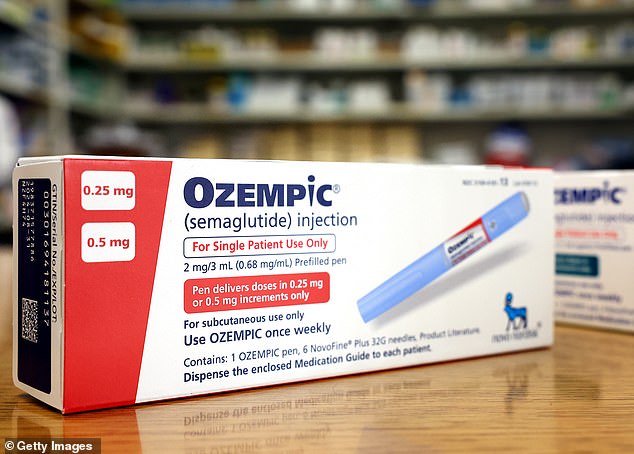Patients taking Ozempic or Wegovy eat MORE calories after stopping the medication than before using the drug, study shows
- One in five patients currently taking weight loss medications reported eating more
- This goes against the mechanism of the drug, which is intended to suppress appetite
- READ MORE: Millions of patients taking Ozempic are at risk of gaining weight
<!–
<!–
<!– <!–
<!–
<!–
<!–
Many patients who stop taking successful weight-loss medications eat more calories than before, a study shows.
A Deutsche Bank survey surveyed 600 Americans who were using or previously used drugs like Ozempic or Wegovy.
The researchers found that 30 percent of those who quit reported eating “a little more” or “a lot more” than before taking the drugs.
The findings are another sign that these are lifelong medications for many patients. There have also been reports of rapid weight gain among former users.

Ozempic is a brand name for the drug semaglutide, which binds to the GLP-1 receptor to suppress appetite
The bank conducted the study to determine whether investors should prioritize stocks in the food and beverage sector, which have fallen steadily since the GLP-1 boom.
The researchers surveyed 600 adults who were currently taking or had stopped taking the drugs.
About 70 percent of participants were still taking the medications, while the remaining 30 percent had stopped taking them.
Participants were asked whether they consumed “a little more,” “a lot more,” “a little less,” or “a lot less” of calories while taking or after taking Ozempic or Wegovy.
Of those still taking the medications, 30 percent said they were eating “slightly less,” while 22 percent said they were eating “much less.”
Ozempic and Wegovy are brand names for the drug semaglutide, which suppresses appetite and causes weight loss.
The drug binds to the GLP-1 receptor, a protein that activates hormones in the brain that keep the stomach full and tell the body to stop eating and avoid cravings.
Despite this mechanism, some participants who were currently taking GLP-1 agonists ate more.
“Perhaps surprisingly, 17% of respondents reported consuming much more and 18% slightly more,” the researchers wrote.
‘This meant that a net 18% of those taking GLP-1 medications ate less.’
In addition, 30 percent of those who stopped taking the drugs said they ate more than before taking them.
This may be due to the fact that the medications no longer suppress the appetite and patients fall back into old habits.
Eating more calories after stopping the medications may make these patients more likely to gain weight again.
Experts have warned that obese patients who stop taking Ozempic or Wegovy could regain the weight they lost, along with extra pounds.
A 2022 study in the journal Diabetes, obesity and metabolismfor example, reported that patients taking semaglutide for 68 weeks lost an average of 17.3 percent of their body weight.
When they stopped treatment, they had regained 11.6 percent of their lost weight by week 120, resulting in a net weight loss of just under six percent of body weight.
Dr. Ania Jastreboff, an expert in obesity medicine at Yale University, said People“If you have a patient with high blood pressure and hypertension, and you give him an antihypertensive drug, and his blood pressure improves, what would happen if you stopped that drug?”
‘Well, their blood pressure would rise again – and that doesn’t surprise us. The same goes for anti-obesity medications.”
